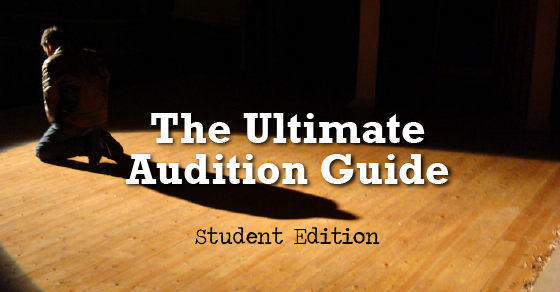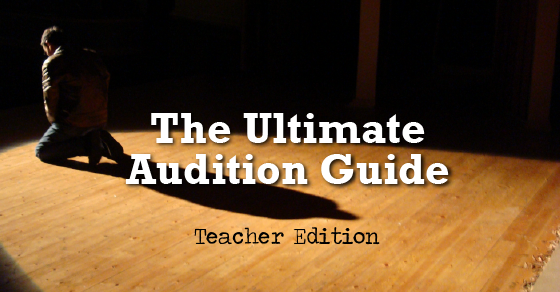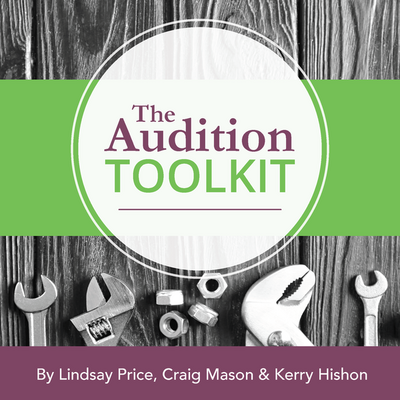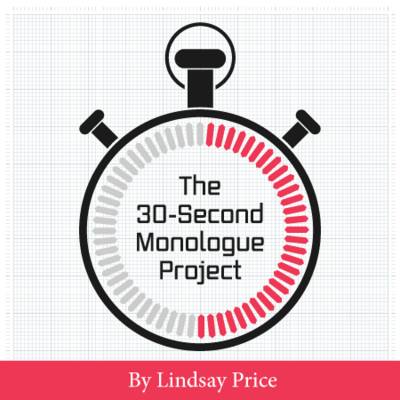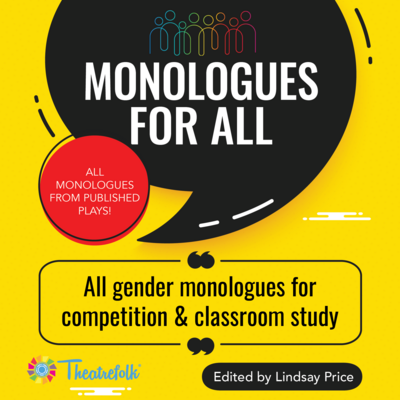Be Amazing in Two Minutes or Less
The Amazing Individual Event. The Amazing Audition. The Amazing Monologue. This is your Guide to being amazing in two minutes or less.
There are many monologue competitions out there, from the act of competing for a role in a play, to vying for a scholarship, to Forensic competitions, to Thespian Individual Events.
Whatever the competition, the guidelines to an amazing two minute performance are essentially the same. What steps do you take to be amazing? Read on!
Choosing The Monologue
Choosing the right monologue counts roughly 30% toward amazing. That may seem like a low percentage. It’s not the words alone on the page that will bring success, but what you do with them. Choosing an award-winning monologue will set you on the right path – but if you choose that monologue the night before and hardly have time to memorize it, let alone work on it, that award-winning sheen won’t help.
Still, choosing the right monologue does put you on the path. So how do you choose it? What’s the key?
Show Off
You want to shine in this moment. That’s what it all boils down to, right? You want to show off your skills, your versatility, your connection to the piece. You want to shine in order to get the part, the scholarship, the ranking. How are you going to shine if you choose a monologue that you hate? Or you choose just because it’s supposed to be good? Or just because it comes from a popular play? Never choose a monologue ‘just because.’
The show off monologue is not a cubic zirconia: all sparkle, no substance. The show off monologue is not doing something so wacky and out of left field because you think it will leave a mark or impress. You’re showing off your skills, remember? That is what’s going to make you shine.
Your show off monologue has two qualities: It’s right for you and and it’s right for the moment.
Right for you: Right for you doesn’t mean easy to do; so like you that you could perform the monologue in your sleep. Having said that, you do want to look for an age-appropriate piece with a character in your age range. It’s not necessarily a skill to play a seventy-year-old when you’re seventeen. More often than not, that’ll be a distraction for those watching you, no matter how good the piece itself is.
What makes a piece right for you? Choose a piece that you love and connect to. The more you love a piece, the more fun you’ll be able to have with it, the more you’ll want to work on it, the more you’ll shine. Let the monologue excite you, not bore you! The more you love a monologue the easier it will be for you to make it live off the page.
That’s the real key to the successful monologue: does it live off the page? Is the story vivid? Is the character three-dimensional and age-appropriate? Your audience, be it judge or director, doesn’t care about the words on the page. They don’t want to see words. They want to experience a living, breathing character.
Right for the moment: Know beyond a shadow of a doubt the purpose of the monologue. Time and time again, good actors lose out because they don’t pay attention to the details. What have you been asked to prepare? Do your pieces contrast? What’s the time limit? Is the play a comedy or a drama? Modern or classical? Is your monologue on a red light list? (meaning, DON’T do it)
Choose a monologue that is right for you and right for the moment and your audience will be completely focused on you. Never make them ask themselves, “Why did they choose this?”
Exercise
Look at the last monologue you performed and answer the following questions.
- What was the situation?
- Why did you choose it?
- What do you like about the monologue?
- What don’t you like about it?
- What do you know about the character?
- What makes the character live off the page?
- What was the response when you performed the monologue?
- Finish this sentence: This monologue is right for me and right for the moment because…
Contrast
Contrast. To compare in order to show unlikeness or differences
Most if not all competitions require two contrasting pieces. And if they don’t, you should always have contrasting monologues ready to go.
Contrast shows your versatility as an actor. Choose monologues that are unlike each other, that have differences. Keep in mind, they still need a show off quality, and they still need to be right for you.
Types of Contrast
Character: What makes the characters different in each piece? How do they physically move about the space? What emotion does each character experience? Are the stories for each character similar or different?
Sound: Read the monologues aloud. Sometimes monologues that look different on the page become similar when spoken. Do the pieces sound similar? Do they move at the same pace? Is the vocabulary different?
Period: Pair Shakespeare, Euripides or Moliere with something modern. The Importance of Being Ernest with Mamet. A Fedeau farce with Arthur Miller.
Genre: Classical, Absurd, Naturalistic, Modern, Postmodern, Melodrama, Comedy, Drama, the list goes on. Don’t use two pieces in the same style of writing.
Mood: Contrast giddy with serious. Which of the following moods contrast well together: expectation, peaceful, frightened, joy, anger, charming, frustration, warmth, playful, condescending, upbeat, festive, sombre, whimsical, anxious, sad, bored, excited, passionate. Define the mood in your monologue.
Pace: Pace is an excellent way to establish contrast. Some pieces will have the pace organically built in through the sentence structure: pauses, run-on sentences, clipped short sentences. If not, look at the character. How urgently do they want to share their story? What tactics do they use to get what they want? Let the character determine the pace.
Exercise
Click here to download a modern monologue. Have students come up with a contrasting monologue, giving their reasons for why it would make a good contrast. Click here for a list of possible choices! (HINT HINT HINT – not all the possible choices on the list are ideal…)
The Material
Monologues are used for a variety of reasons within plays. To share a thought, a story, an emotional outburst. A revealing character moment. A private moment between the character and the audience. What makes a monologue amazing for competition?
Choose a monologue that is….
Active. You don’t have to physically run in circles to have an active monologue. A character dealing with conflict is active. A character making a life and death decision is active. A character confronting another for the first time is active. And having said all that, a little blocking doesn’t hurt – which we’ll talk about in the Prep section.
Emotion-based. It’s always better to choose an emotion-based monologue over a storytelling monologue. It’s more engaging to watch a character deep in the throws of an emotion. But don’t confuse emotion-based with emotional. Being emotional (such as sobbing or shouting for your whole monologue) comes across as self-indulgent rather than engaging.
Character-driven. There are no lights, no sets, no costumes, no other actors, no rest of the play. Just you and the words. Give yourself a helping hand and make sure those words come out of the mouth of a three-dimensional character.
Well written. Seem obvious? Be on the lookout for all of the above in your piece. An interesting character in the throws of an emotion-based moment. Look at the sentence structure; is it ordinary or something you can have fun with? Is there some subtext? Is there a journey within the monologue for your character?
Avoid monologues that…..
Are too long. Always err on the side of too short rather than too long. That way you can play with your monologue rather than rushing to beat the clock.
Don’t work out of context. If the monologue doesn’t work on its own or without explanation, don’t use it.
Tell a story rather than show a story. Monologues are often used to advance the plot of a play. These types of monologues do nothing to show off your skills as an actor. There’s nothing for your audience to connect to.
Don’t come from plays. Particularly if the rules of your particular competition state as such. Certainly there are amazing monologues that come from outside the realm of theatre. If you want to work on your skills as a theatre actor, in theatre competitions, use what theatre gives you.
Exercise
Click here to download two monologues. One is a great competition monologue. The other is not. Have students read the pieces aloud and determine which is which and why.
Here are my observations:
Sweep Under Rug: There is certainly a clear character in this monologue with a specific voice. While there’s the potential to have fun with the characters, there’s also a lot of plot being set up. There’s more storytelling here than any emotional journey – the character’s emotional state is exactly the same from beginning to end and that’s an issue if you’re looking for something to win a competition. It’s much more about the story and much less about the character.
Deck the Stage: This is a character-driven emotion-based monologue. The character is on a roller-coaster of emotion as she not only confronts the person she’s talking to, but reveals some very deep wounds about her dad. Not only that, but there are specific clues for how to play the character physically – if she works the night shift at the 7-11, she’s going to be exhausted, frustrated, spitting mad. These are great clues toward an award-wining performance.
Monologue Collections
Should you get your monologues from a monologue collection? Collections certainly are handy. They’re easy to get ahold of. It helps to have a variety of pieces right at your fingertips with all the work done for you. They are an excellent first step toward choosing a piece. And that’s how they should be considered: a step in making a monologue choice, not the whole process.
Why you should find your own pieces instead of relying on a collection?
Collections make it easy to avoid reading the whole play. That’s dangerous. You really should read the play. If you don’t, you’re missing out on potential Awesomeness by not learning the whole story of your character.
Collections are made up of popular monologues from popular plays. On its own not a bad thing. It’s fun to read monologues from the hot plays, or to even see what’s considered popular. But watch out for things that are popular. You’re not the only one with that collection in your hands. They’re in many, many other actors hands. And that means potentially many, many other actors are choosing the same monologue as you. There’s nothing worse in a competition than to be the third (or fifth, or twentieth) person performing the same monologue. You automatically get compared to other actors , putting you at a disadvantage.
Now. That’s a lot of do this/don’t do this. Seems like a rather complicated process just to pull a couple of words together for two minutes. Can you get a great monologue out of a collection or outside the theatre world? Of course. Can you win using a storytelling monologue over emotion-based? Of course. Are rules meant to be broken? All the time. But make sure you’re breaking the rules in order to be awesome, and not because you don’t want to put the work in. Shortcuts will not get you the part or win you the competition. And in the end, you’re only shorting yourself.
Preparing The Monologue
If you prep well, you’ll achieve 60% toward amazing (and if you’re playing along that leaves only 10% for performance. Chew on that for a moment)
You must prepare your monologue. You must prepare your monologue. And I’ll say it again: You must prepare your monologue. Can an actor do a good job if they don’t prepare? Depends on the actor and the monologue. Depends on how the other actors have prepared. It even depends on the mood of the particular audience.
But why rely on luck when you can build a preparation method that will work every time, for every monologue, for every situation?
Character
Character development is key if you want to show off your skills. Here’s a list of questions every actor should ask and answer regarding their monologue’s character. If there isn’t an answer for every question, think about whether the monologue is the right choice.
- List all known character details (name, age, family, education, occupation, etc)
- What does my character want?
- Do they get it? Why or why not?
- What change happens to my character within the monologue?
- Who are they speaking to? What’s the relationship?
- What emotions does my character experience?
- What is my character doing, thinking, feeling the moment before the monologue?
- How does my character move?
- How does my character stand?
- What pace does my character speak? What language do they use?
- What does the language say about the character?
- What adjectives describe my character? How can I physicalize these adjectives?
- What do I think of this character? How do I relate to this character?
Voice and Sound
Pay attention to the sound of your monologue. You can have the best character development and the most interesting piece, but if you mumble, speak in a monotone or speak so fast no one can understand a word, it won’t matter. Your voice is a powerful tool, use it well.
- Project but do not yell. Yelling turns off an audience if you do it for long.
- Record the monologue and listen back. Is every word clear? Is there variety? Is the variety driven by the piece?
- Warm up your voice before you perform. Never perform with a cold, unused voice.
- Tongue Twisters are an excellent way of working on your diction. Really enunciate and articulate to make every word distinct. Make Tongue Twisters part of your warm up. Click here for a Tongue Twister database.
- Breathe! When you control your breath, you control your voice.
Exercise
Use this monologue to practice analyzing the sound elements of a monologue.
- Circle every sound element in the monologue. Is there any repetition? Alliteration? Are the sentences clipped short? Run on sentences? What’s the punctuation? Are there pauses built in? Click here for an example.
- What does the character sound like? How do they speak? Define their vocabulary. What language do they use?
- Where will you breathe in the monologue?
- Choose one place to pause. Don’t make it arbitrary, look at the character and decide why they would pause.
- Read the piece aloud. What is the pace of the monologue? Where does the pace change?
Movement
Staging shouldn’t be ignored simply because you’re performing for a mere two minutes. Two minutes is a long time for an audience to watch someone standing still. On the other hand, it’s not appropriate to move chaotically about the space from beginning to end. Your movement must be carefully thought out, planned and practiced.
There are two types of movement in a monologue performance.
Good movement: Specific, character-driven blocking. A movement to impact the climax. A pose or gesture to establish character. Good movement will always add to the overall presentation.
Bad movement: Wander-itis, vague gestures, movement and gestures that come from the actor instead of the character. Moving for the sake of moving because the actor thinks they’re supposed to.
How do you achieve the good and banish the bad?
Avoid Wander-itis. Wander-itis (random, unmotivated wandering) is one of the most common movement issues. Practice your monologue pretending that your feet are welded to the floor. The more you practice, the more natural it will become.
Less is more. Come up with one specific move, one pose and one gesture for the piece. Each must be character driven. Never move for the sake of moving. Click here to see examples for two monologues.
Videotape your performance. Watch it with the mute on to focus solely on your movement. Do you stand your ground or wander? What do you do with your hands? Are your movements character driven or are they things you do? Watch for adjusting of clothes, brushing hair away from the face, shuffling feet, and hands that wave about for no reason.
Perform your piece in front of a friend. Have them raise their hand every time you do something out of character.
What Else?
Practice, practice, practice. The more you rehearse the monologue, the more you’ll discover about your character, coming up with the exact right movement, the more ingrained the piece will become. That’s when you become amazing.
Time your monologue. Make sure you are well under any time limits. If you have five minutes for two pieces, don’t choose two two and a half minute pieces! Going overtime is the easiest mistake to make, and the easiest problem to solve.
Memorizing lines. The less time you spend with your monologue, the easier it will be to forget your lines. Write them out, say them out loud, learn them out of order, say them fast, say them slow, repeat, repeat, and repeat it again.
Read the whole play. Read the whole play. Read it. Really.
Performing The Monologue
Why does the performance itself only count 10% toward amazing? If you’ve chosen the monologue correctly and you’ve put in the advanced legwork, the performance should be the easy part.
Ah, ‘should’ be the easy part. For some, performing is never easy…..
Before You Even Begin
Be prepared. That will allow you to worry about one less thing.
Be professional. You can act professionally no matter your age or situation. Be on time and have your paperwork filled out properly. Don’t disrupt your fellow performers. Don’t waste anyone’s time. Don’t apologize for anything -?? for having a cold, for being unprepared, for being late. Do your best under whatever circumstances you’re in.
Dress appropriately. Choose clothes that allow you to show off your acting and don’t distract from your performance. Choose comfortable pieces that you don’t have to adjust. Likewise, keep your hair off your face and keep it from getting in your way.
Breathe. It helps. Really. Take a deep breathe before you start to speak.
Focus. Don’t worry about what anyone else is doing. If you start comparing your work to others, you’re sunk before you’ve begin. Focus on your breathing, run the first line of the monologue silently, run through the movements in your head.
Warm up. Find a place that you can do a few vocal warm ups, and some stretching. Get yourself ready to act.
Smile and make eye contact during your introduction, and then don’t look at your audience while you perform. They want to be able to observe you without being stared at.
And…. Make sure you know the name of the playwright and the play your monologue comes from.
Conquering Stage Fright
Sometimes all the rehearsal in the world can’t conquer the biggest demon of them all: stage fright. It happens to the most seasoned actors. So how do you deal with it?
Be prepared. Have you heard this one before? Must be important. But when you’re prepared, the work you’ve put into the monologues can override nerves.
Realize that nerves are natural and that everyone gets nervous. You should be nervous. This process can be quite nerve wracking. You just don’t the process to become all about the nerves. Let the nerves fuel your performance instead of preventing it.
Practice in front of an audience. The more you practice, the less terrifying the performance aspect. Your audition or competition slot should never been the first time you’ve performed your pieces in front of people.
Visualize your success. Some actors work themselves into such a lather before hand that everything they imagine going wrong happens right on cue. Focus on the positive before you perform. This isn’t about being boastful about your performance. Simply see yourself going through your monologue as it’s supposed to, without any mistakes. Know that you’ve practised enough and have the ability to do well.
You Have Ten Seconds
One last thing to think about. You have ten seconds , not two minutes to impress your audience. It takes the judge, the adjudicator, or the director ten seconds to make a call about what they see and whether or not they’re going to engage further.
Yes, that’s an insanely short period of time, but that’s what you’ve got. So, don’t leave your best stuff till the end. Hook your audience from the first first word, make them lean in, and then make them want more when it’s over.
Processing Feedback
Receiving feedback is part of the game in competition. It’s an important part of the process – the right feedback can help a lot. But how do you decipher the right feedback from the wrong?
Because here’s something that may surprise you. Not all judges know what they’re doing. Not all auditions are fair. Some adjudicators make subjective remarks. Some people, are just mean.
Of course, there are some who believe 100% in the process, who are committed to giving constructive criticism and only want your performance to be the best it can be.
But how do you tell the difference between the two? How do you know when you should take criticism to heart or ignore it? How do you interpret feedback in a way that helps you grow as a performer?
You should pay attention to feedback when…..
You consistently get the same note. If every judge gives you the same note such as ‘Watch your diction; it was hard to understand ever word’ Or, ‘make sure each move is character driven, there was a lot of wandering around the space.’ If the same note comes back to you time and time again, then address it. If you’re getting a good response from multiple adjudicators, that’s something to celebrate!
You receive a suggestion to try something different. There should be a specific suggestion, not just ‘do something different.’ But if a judge has gone out of their way to suggest a specific path, why not try it? You may discover another level to the piece. This is especially important if you’re coming in second a lot or getting Excellent scores instead of Superiors. Be open to change. Those who are willing to change, get better.
You should ignore feedback when….
You receive negative scores without written backup. A judge who gives you a failing grade without specific reasoning is being mean. Perhaps the performance wasn’t up to snuff. But it’s a judge’s job to justify their decisions.
You receive negative scores without suggestions for change. Likes and dislikes are subjective. If feedback is solely focused on the negative (I didn’t like this) how can you improve?
The feedback is focused on the choice of monologue rather than your interpretation and performance. Some people just don’t like certain monologues. It shouldn’t matter in a competition but it does. If all the feedback is centered around the dislike of the piece rather than what you did with it, don’t take it to heart.
The scores don’t match the written evaluation. It happens time and time again -?? the written evaluation is all praise and then the score is lower than you’d anticipate. The feedback should always give you suggestions to grow.
Related Articles
Audition Toolkit
by Lindsay Price, Craig Mason, and Kerry Hishon
Teach students to present their best selves in an audition situation with The Audition Toolkit - complete with articles, exercises, tips and more for both teachers and students.
The 30-Second Monologue Project
by Lindsay Price
Give students the confidence, skills and tools they need to master the monologue with The 30-Second Monologue Project. This four-lesson unit guides students from the first moment to a successful performance.
Monologues for All
by Lindsay Price
Many monologue books have monologues with only male- or female-identified characters. This resource allows students to infer the identity of the character.


